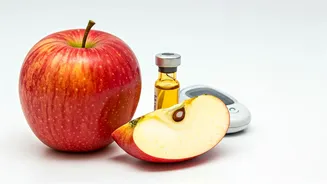Food and Medication
The interaction between food and diabetes medication is a critical aspect of diabetes management. Some foods can significantly affect how your body processes
these medications, leading to unexpected changes in blood sugar levels. This effect can either diminish the medication's effectiveness or, conversely, amplify it, potentially causing hypoglycemia. This article aims to identify the foods that frequently cause these issues, providing clear insights into managing your diet alongside medication effectively. By understanding these interactions, individuals with diabetes can work towards maintaining stable blood glucose levels and avoiding complications. The goal is to provide a comprehensive understanding to help people make informed dietary choices and navigate their treatment plans with confidence.
Sugary Beverages Beware
Sugary drinks are high on the list of foods to avoid. They're quickly absorbed into the bloodstream, causing a rapid spike in blood sugar. This sudden increase can overwhelm the medication's ability to regulate glucose levels. Sugary drinks include sodas, fruit juices (even those without added sugar), and sweetened teas. These drinks offer little nutritional value and can lead to weight gain, making diabetes management even harder. When managing diabetes, it is best to opt for water, unsweetened tea, or other calorie-free drinks. These choices help avoid blood sugar spikes and maintain a healthy weight. Always read labels to identify hidden sugars in beverages.
Refined Carbohydrates Listed
Refined carbohydrates are another group of foods to monitor carefully. These carbohydrates, such as white bread, white rice, and pastries, are quickly broken down into glucose, causing a rapid rise in blood sugar. This effect is often magnified because they are often low in fiber, which would usually slow down glucose absorption. The rapid rise in blood sugar can necessitate more medication or result in periods of hyperglycemia. For individuals with diabetes, it's preferable to choose whole-grain alternatives, which contain more fiber, help in slow glucose release, and minimize significant blood sugar fluctuations. Consulting a registered dietitian can also help to create meal plans that include healthy carbohydrate sources and promote blood sugar stability.
Processed Foods Explained
Many processed foods are loaded with hidden sugars, sodium, and unhealthy fats, which can negatively affect blood sugar control. Items like packaged snacks, frozen meals, and pre-made sauces often contain added sugars, which can lead to blood sugar spikes. In addition, these foods may lack essential nutrients like fiber, which plays a critical role in managing glucose levels. The combination of high sugar and low fiber makes these foods a problem for people with diabetes. When shopping, always read the nutrition labels carefully, looking for hidden sugars and avoiding items with large amounts of added sugars or simple carbohydrates. Preparing your meals at home with fresh ingredients allows for better control over ingredients and helps maintain optimal blood sugar levels.
Certain Fruits Considered
While fruits are a part of a balanced diet, certain varieties can impact blood sugar more than others. Fruits like mangoes, grapes, and bananas are naturally higher in sugar. When you take diabetes medication, you must monitor portion sizes. The amount of sugar in fruits can still cause blood sugar spikes, especially when consumed in large quantities. It's not about avoiding these fruits completely but eating them in moderation and balancing them with other foods. Pairing fruits with protein or healthy fats can help slow down glucose absorption and reduce fluctuations. Consulting with a healthcare provider or a registered dietitian can help create a personalized plan to include fruits safely within your diabetes management strategy, considering your individual needs and medication regimen.
High-Fat Foods and Risks
Foods high in saturated and trans fats can affect how the body uses insulin, potentially worsening blood sugar control. These fats, frequently found in fried foods, processed snacks, and some meats, can contribute to insulin resistance, making it harder for the body to regulate glucose. Insulin resistance can result in the need for increased medication. Eating high-fat foods may also lead to weight gain, a risk factor for diabetes complications. A dietary approach that prioritizes healthy fats, such as those found in avocados, nuts, and olive oil, can improve insulin sensitivity and improve overall health. Focus on incorporating lean proteins, vegetables, and whole grains into your diet for better blood sugar control and overall well-being.












